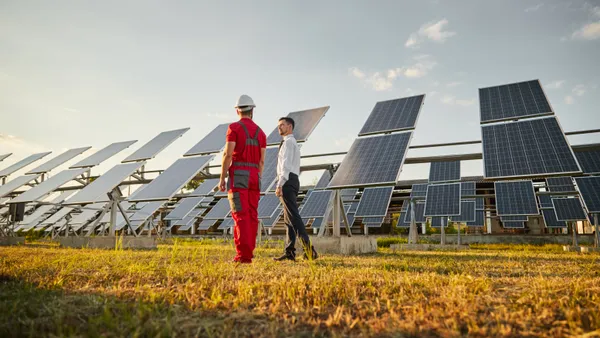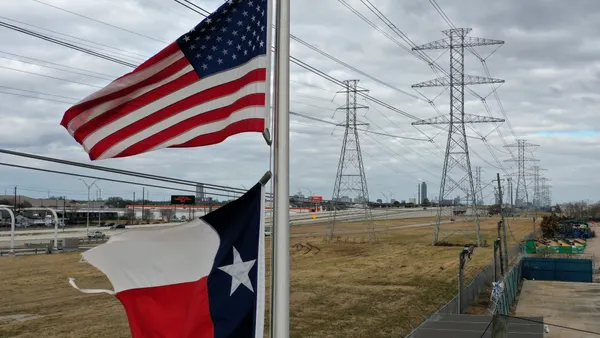Dive Brief:
- The U.S. Environmental Protection Agency plans to revoke its “endangerment finding” for greenhouse gas emissions, which underpins regulations that aim to cut those emissions from the power, auto, and oil and gas sectors, the EPA said Tuesday.
- The EPA’s effort to rescind its finding that GHG emissions threaten public health will face “significant legal pushback that could derail implementation,” research firm Capstone said Tuesday. “Previous challenges to the finding have been unsuccessful, and greenhouse gases were codified as a pollutant under the [Clean Air Act] in the Inflation Reduction Act,” Capstone analysts said.
- The EPA’s proposal ignores established climate science, according to David Bookbinder, director of law and policy at the Environmental Integrity Project. “This baseless effort to pretend that carbon dioxide and other greenhouse gasses that cause climate change are not harmful pollutants is nothing more than a transparent attempt to delay and derail our efforts to control greenhouse [gas] pollution at the worst possible time, when deadly floods and heat waves are killing more people every day,” Bookbinder said in a statement.
Dive Insight:
After the U.S. Supreme Court ruled in 2007 that the EPA could regulate carbon emissions under the Clean Air Act, the Obama and Biden administrations used the 2009 endangerment finding to limit greenhouse emissions from power plants under rules that never took effect.
The endangerment finding was upheld by a federal appeals court in 2012, and the U.S. Supreme Court declined to review that decision.
The EPA is proposing to rescind the endangerment finding and all resulting GHG emission standards for new motor vehicles and engines for model years 2012 to 2027 and beyond, according to a proposed rule released by the EPA that has not yet appeared in the Federal Register.
The proposal has no immediate impact on regulatory enforcement, and the earliest it could be adopted is December. It could take several years before any legal challenges are settled.
The EPA said that, on balance, “GHG emission standards harm public health and welfare by increasing prices, decreasing consumer choice, and slowing the replacement of older vehicles that are less safe and emit a greater volume and variety of air pollutants than new motor vehicles and engines.”
The EPA cited a U.S. Department of Energy report released Tuesday that said climate models exaggerate estimates of future global warming and that carbon dioxide-induced warming may be less damaging economically than generally believed. The report was written by five scientists who dispute the scientific consensus behind climate change.
Last year was the hottest year for the planet since record keeping began in the 1880s, according to the National Aeronautics and Space Administration and confirmed by scientific bodies around the world. The ten warmest years on record have all occurred in the last decade.
The Edison Electric Institute is reviewing EPA’s proposal, according to a spokesman for the investor-owned utility trade group.
“We support EPA establishing clear, consistent regulatory policies that drive energy infrastructure investment and strengthen America’s economic and energy security,” the spokesman said in an email. “It is essential that EPA use its authority to craft flexible regulations that account for impacts to reliability and customer bills.”
Reversing the endangerment finding would reduce compliance costs for independent power producers and utilities with significant gas- and coal-fired power plant fleets, according to Capstone.
However, the EPA’s effort creates uncertainty for sectors affected by the endangerment finding, according to Capstone.
“The proposed revocation will create confusion and uncertainty and upend years of significant and costly planning to be in compliance with the regulatory framework that has been constructed since the finding was issued,” Capstone analysts said.
It would likely have little effect on carbon cap-and-trade programs, which are tied to state laws, Capstone said.
“Notably, as the federal government takes a step back on climate action, emissions levels in jurisdictions with carbon pricing programs will likely rise, creating higher demand for compliance credits and providing moderate tailwinds behind prices,” Capstone analysts said.
The EPA’s proposal could also affect electric vehicle sales, according to Capstone.
“Revoking the endangerment finding would undo the historically stringent Biden era emissions standards that, according to forecasts, would have driven electric vehicle uptake to reach by 2032 a 55% share of new car sales, and a 13% share for hybrid vehicles,” the research firm’s analysts said.
Comments on the EPA proposal are due by Sept. 21, according to the agency’s proposed rule. DOE will also accept comments on its greenhouse gas report after a notice is published in the Federal Register.
If the EPA finalizes the rule in December, challenges to the agency’s decision will be filed early next year, teeing up an appeals court decision in mid-2027, according to Capstone. If the U.S. Supreme Court agrees to consider an appeal of the lower court’s decision, the high court could issue a ruling in June 2028, the research firm said.












